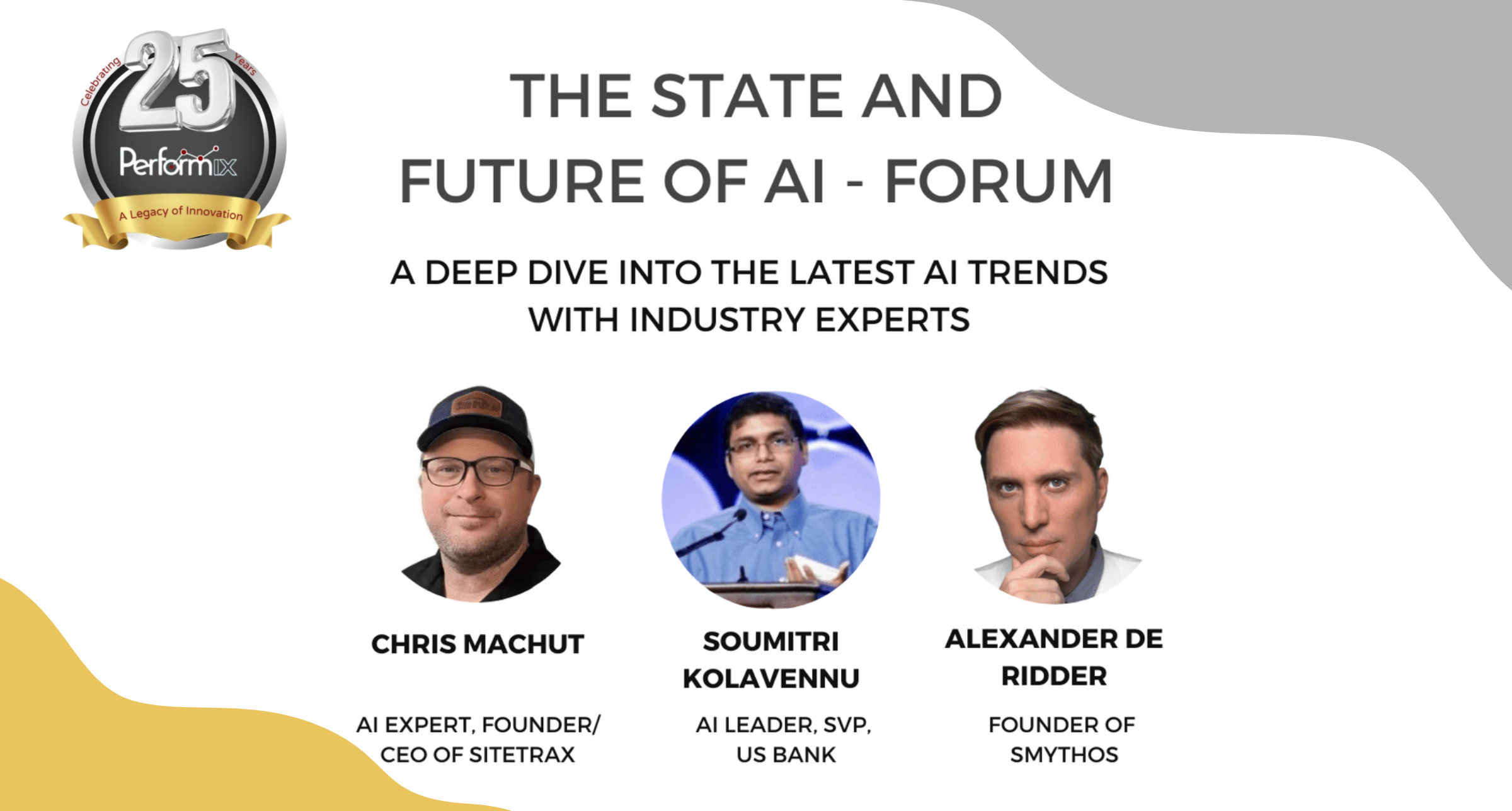Christopher Machut, CEO of SiteTrax.io, joined a panel of experts to celebrate Performix’s 25th anniversary, sharing insights on AI’s transformative impact and the future of innovation.
On December 5th, 2024, Performix commemorated its 25th anniversary with a spectacular event: The State and Future of AI Forum. Held as a tribute to the company’s commitment to innovation, this forum brought together an elite panel of AI experts to discuss artificial intelligence’s current state, limitations, and transformative potential. The event, hosted by Sunil Banfa, Performix’s CEO, underscored the profound impact AI continues to have across industries.
Setting the Stage
Sunil Banfa opened the forum by highlighting Performix’s quarter-century journey of excellence and its unwavering focus on driving technological advancement. With AI being at the forefront of global innovation, Banfa emphasized the importance of fostering meaningful dialogues to navigate the challenges and opportunities ahead.
The Panel of Experts
The distinguished panel comprised three thought leaders who provided diverse perspectives on AI:
Alexander De Ridder, Co-founder and CTO of Smith OS brought his expertise in coordinating specialized AI agents. He detailed how modular AI systems can optimize processes in real time, enabling organizations to achieve unprecedented efficiencies.
Soumitri Kolavennu, Senior VP at US Bank, shared insights from his extensive background in R&D, systems engineering, and technology commercialization. His perspective shed light on the challenges of integrating AI into legacy systems while ensuring compliance and ethical standards.
Chris Machut, CEO of SiteTrax.io, showcased innovations in AI-powered intermodal asset tracking. He demonstrated how cutting-edge AI solutions are reshaping supply chain optimization, reducing operational costs, and enhancing logistics management.
Pioneering Insights into AI’s Present and Future
The panel discussion delved deeply into the multifaceted world of AI, focusing on its current achievements, ongoing limitations, and future possibilities. While AI has seen extraordinary breakthroughs in areas like natural language processing, computer vision, and reinforcement learning, the panelists agreed that it remains in its formative years, with much untapped potential ahead. They addressed critical challenges, including data privacy concerns, algorithmic biases, and the energy demands of scaling AI systems, emphasizing the importance of responsible development practices.
Looking forward, the experts painted a vision of AI seamlessly integrating into human decision-making processes, enhancing productivity, and unlocking transformative possibilities in sectors such as healthcare, finance, and supply chain management.
Recent Breakthroughs in AI
The forum shed light on several noteworthy advancements in artificial intelligence. Chris Machut emphasized the transformative nature of 2024, a year marked by significant strides in AI applications. He highlighted advancements in computer vision and large language models, which have become increasingly accessible and practical.
Likewise, Soumitri Kolavennu elaborated on the growing impact of generative AI across multiple modalities, including text, video, audio, and music, noting the rapid evolution of multimodal models that are reshaping the boundaries of creativity and functionality. Furthermore, Alexander De Ridder delved into pioneering paradigms in scaling AI, such as inference-time compute scaling, and spotlighted groundbreaking releases like OpenAI’s GPT O1 model and Google’s GenTest for weather prediction. Together, these developments are pushing the limits of AI’s capabilities and utility.
Limitations of Current AI Models
Despite these advancements, significant challenges remain in the development of AI systems. One notable hurdle is memory management, as AI lacks efficient mechanisms for storing and forgetting information, which limits its ability to adapt dynamically over time. Another pressing issue is machine unlearning, where reversing learned biases or incorrect data continues to be a complex and underexplored area.
Additionally, context window limitations constrain models in their ability to manage large amounts of information. Innovations such as infinite context windows and context caching hold promise for addressing this challenge. Inference costs also pose substantial financial and energy demands, making scalability an ongoing concern. Finally, alignment problems ensuring AI’s outputs align with human values or regulations—represent a critical yet complex area of research requiring significant attention.
Social and Job Market Impact
AI is transforming the social and job landscape in profound ways. By acting as a virtual assistant, AI enhances productivity and amplifies individual capabilities, allowing workers to focus on high-value tasks. While jobs involving repetitive tasks are increasingly subject to automation, supervisory and creative roles remain indispensable. The panelists emphasized the importance of upskilling and reskilling to adapt to AI-augmented workflows, ensuring a workforce that is resilient and prepared for the evolving demands of the job market.
Future Applications and AGI (Artificial General Intelligence)
The forum also explored the exciting potential of future AI applications and the pursuit of AGI. In education, AI is transforming learning experiences through personalized tutoring and interactive tools, offering students infinite patience and adaptability. While progress in AI has been remarkable, the timeline for achieving AGI—an intelligence surpassing human capabilities across all domains—remains distant. The panelists stressed the need for continued research and ethical considerations to guide advancements in this area.
Audience Questions and Responses
The forum concluded with a vibrant Q&A session, where attendees engaged the panelists with thought-provoking questions that brought forward intriguing topics from the audience. Regarding the coolest AI applications, the panelists highlighted real-time video generation for creative projects and advancements in robotics, such as a one-handed robot solving a Rubik’s Cube in seconds. In response to inquiries about key technology developments, they discussed the pivotal role of GPUs in enabling scalable neural network training, exemplified by the AlexNet architecture, and the discovery of scaling laws that make training large AI models more efficient and predictable.
A Resounding Success
The event not only celebrated Performix’s legacy but also served as a beacon of inspiration, igniting conversations that will shape the future of AI. AI is rapidly evolving, with groundbreaking advancements in generative models, multimodal applications, and real-world implementations.
While challenges such as memory, alignment, and scalability persist, the future of AI offers unparalleled opportunities to enhance human potential and redefine industries. Companies like SiteTrax.io exemplify innovation at the cutting edge, ready to leverage AI’s transformative power to revolutionize operations and drive progress.

